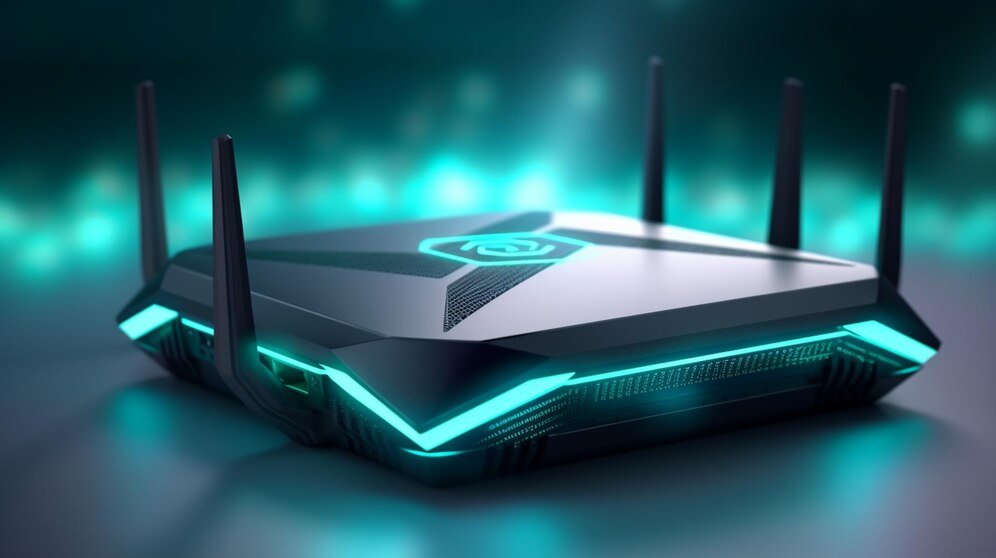How Do Routers Work? A Deep Dive into the Heart of Your Home Network
Routers are the unsung heroes of today’s huge technological landscape, silently powering the digital world. However, what is a router really, and how does it operate? Let’s examine the many facets of routers, including their uses, types, and significance in our day-to-day existence.
Understanding the Basics: What is a Router?
A router is essentially a device that links several networks together and routes data between them. It serves as a dispatcher, selecting the most effective path for data packets to take when navigating various networks, guaranteeing that your emails, videos, and other data are efficiently delivered to their intended location.

In the OSI model, routers function at the network layer, which is the third layer. This means that they oversee the routing process, which determines the routes taken by data packets to get to their intended destination. The internet as we know it would not work without routers since they are essential to controlling traffic between various networks.
The Role of Routers in Home Networks
The router acts as a gateway between your home network and the internet in a typical home configuration. It establishes a connection with your modem, which is connected to your internet service provider (ISP), and then uses Ethernet or Wi-Fi connections to spread the internet connection to every device in your home.
However, routers are not limited to sharing a single internet connection. They also control the flow of information inside your home network. For example, the router makes sure that everything works seamlessly when you stream a movie on your smart TV while someone else is video chatting from a different room.
Types of Routers
Routers come in various types, each designed for specific needs:
- Wired Routers: Ethernet cables are used to directly connect these routers to devices. They are renowned for offering a quick and reliable connection, which makes them perfect for streaming HD video or playing games.
- Wireless Routers: Wireless routers, the most popular kind found in households, enable devices to connect to the internet without the use of cables. They enable internet connection throughout your house via Wi-Fi technology.
- Core Routers: ISPs and big businesses employ these high-performance routers to control data flow at the network’s center.
- Edge Routers: These routers, which are situated at the edge of networks, control data flow between internal and external networks, including the internet.
- Virtual Routers: These routers are software-based and may be installed on a server. They function as routers without requiring hardware.
How Do Routers Work?
Routers perform several key functions to manage and direct data traffic:
- Packet Forwarding: Data is divided into tiny packets before being delivered over the internet. It is the router’s responsibility to transport these packets to the appropriate location. In order to accomplish this, it reads the packet’s destination IP address and chooses the optimal path for it to go.
- Network Address Translation (NAT): Your home network is given a public IP address by the router through the NAT mechanism. In order to preserve the few IP addresses that are available, this enables numerous devices to share a single IP address.
- DHCP (Dynamic Host Configuration Protocol): Every device on your network is given a unique IP address by the router via DHCP. This guarantees that information is transmitted to the right device without error.
- Firewall and Security: Firewalls that are integrated into routers guard your network against illegal access. They ensure that only secure data enters your network by screening all incoming and outgoing traffic and thwarting any potential threats.
- Quality of Service (QoS): QoS is a feature that gives some types of traffic more priority than others. For instance, even when multiple devices are utilizing the internet at once, QoS can prioritize video traffic when you are streaming a movie to avoid buffering.
Advanced Router Features

Modern routers come with a host of advanced features designed to enhance your network experience:
- Dual-Band and Tri-Band Routers: These routers may function in several frequency ranges, including 2.4 GHz and 5 GHz. They can now manage more devices at once and cut down on interference, which makes connections faster and more reliable.
- Mesh Networking: Mesh routers are made up of several components that cooperate to offer smooth Wi-Fi coverage throughout your house. They are especially helpful in big houses or places where there are dead Wi-Fi zones.
- Parental Controls: A lot of routers come with parental control options that let you limit access to particular websites or allocate specific devices’ internet usage time.
- Guest Networks: In order to provide visitors with internet access without jeopardizing the security of your primary network, routers can be used to set up other networks for them.
- VPN Support: Certain routers have built-in VPN capabilities, so you may secure your privacy and encrypt your internet connection without installing any extra software.
Choosing the Right Router
When selecting a router, consider the following factors:
- Speed: Seek out a router that is compatible with the most recent Wi-Fi standards, including Wi-Fi 6, which provides improved performance and faster speeds in congested networks.
- Range: Take into account the router’s range and the size of your house. A mesh router setup can be your best bet if your house is big.
- Security: Make sure the router has strong security features, such as frequent firmware upgrades, WPA3 encryption, and a firewall.
- Ease of Use: Select a router that has a simple setup procedure and an easy-to-use UI. Certain routers include smartphone apps that simplify network management.
- Price: Even if more expensive routers have superior features and performance, it’s still crucial to pick one that works for you and your needs.
The Future of Routers

Routers will continue to change along with technology. Smart homes, 5G, and the Internet of Things (IoT) will all demand more sophisticated routers that can handle more devices and more data. Artificial intelligence may be included into routers in the future to improve network performance and offer even more security.
Conclusion
Our digital life would not function without routers, which silently control data flow and guarantee a safe and seamless online experience. You can maximize the performance of your home network by learning how routers operate and selecting the finest one for your requirements.
FAQs
Q: How does a router differ from a modem?
A: A modem connects your home to the internet, while a router distributes the internet connection to your devices. The modem translates the signal from your ISP, and the router manages the traffic within your network.
Q: Can I use multiple routers in my home?
A: Yes, you can use multiple routers to extend your network’s range. This is often done using a mesh network, where additional routers (or nodes) work together to provide seamless coverage.
Q: How often should I replace my router?
A: It’s generally recommended to replace your router every 3-5 years to ensure you have the latest technology and security features. However, if your current router is performing well, there may be no immediate need to upgrade.
Q: Do I need a router if I only have one device?
A: While a router is not strictly necessary if you have only one device, it is still beneficial for security purposes and if you plan to add more devices in the future.
Q: How can I improve my router’s performance?
A: To improve performance, place your router in a central location, update its firmware regularly, and reduce interference from other electronic devices. You can also consider upgrading to a newer model with better features.




